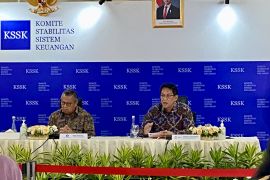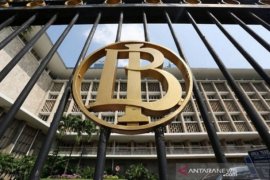"Conditions remained maintained with regard to financial market, fiscal and banking sectors," Chatib Basri said.Jakarta (ANTARA News) - Finance Minister Chatib Basri said here on Thursday that financial system stability remained maintained despite domestic and external pressures that could potentially disrupt Indonesias economic fundamentals.
"Conditions remained maintained with regard to financial market, fiscal and banking sectors," he said after a Financial System Stability Coordination Forum (FKSSK) meeting.
The tri-monthly meeting was also attended by central bank governor Agus Martowardojo; chairman of the board of commissioners of the Financial Service Authority, Muliaman Hadad; and the chairman of the board of commissioners of the Deposit Insurance Corporation, Heru Budiargo.
The meeting discussed financial system stability conditions in the second quarter of 2014, including the development of macroeconomic, fiscal, financial market, banking and nonbanking conditions domestically and globally.
The minister said Indonesias economic growth prospects were still strong, although it will be lower than predicted earlier, as domestic demand had been moderated by economic structural adjustment process.
"The risks however remain to be monitored, which are related to current account deficit and liquidity problem," he said.
State securities and share markets have remained relatively stable despite political effects from recent legislative and presidential elections.
Capital and banking intermediary meanwhile has also shown positive performance, and banking liquidity has also been maintained accompanied by adequate nonbank financial industrys performance in the midst of interest hike.
"Fiscal resilience has also been maintained although more efforts are required to achieve the states revenue target and due to an increasing quality in government spending and increasing economic drive," he said.
The FKSSK has taken part in monitoring external pressures such as slow economic development in China, decline in price of commodities, risk of The Feds policy normalization, which could trigger risk-off sentiment, and the risk of external financing that could increase pressure in the financial market.
In view of that, the FKSSK agreed to monitor the risk factors and encourage members to individually respond by issuing correct policies in line with their authorities.
The FKSSK also agreed to strengthen coordination to mitigate sources of vulnerabilities that could potentially disrupt financial system stability, especially inflation, current account deficit, private foreign debt management, and deepening of financial market.(*)
Editor: Heru Purwanto
Copyright © ANTARA 2014










